全国高校网络教育部分公共基础课统一考试大学英语(B)模拟试卷7(附参考答案及解析)
- 格式:doc
- 大小:115.50 KB
- 文档页数:7
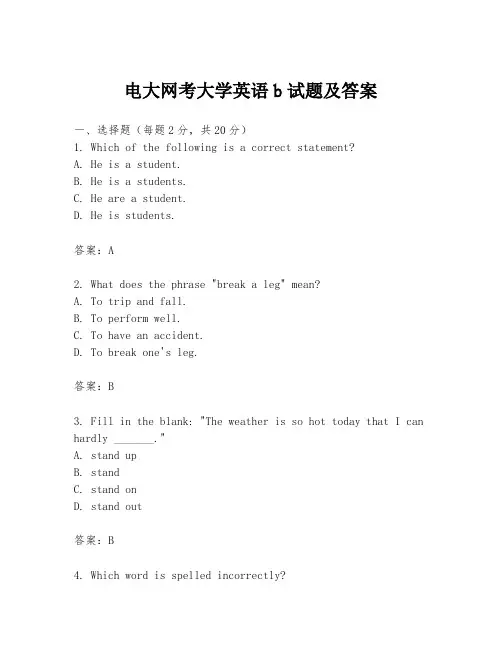
电大网考大学英语b试题及答案一、选择题(每题2分,共20分)1. Which of the following is a correct statement?A. He is a student.B. He is a students.C. He are a student.D. He is students.答案:A2. What does the phrase "break a leg" mean?A. To trip and fall.B. To perform well.C. To have an accident.D. To break one's leg.答案:B3. Fill in the blank: "The weather is so hot today that I can hardly _______."A. stand upB. standC. stand onD. stand out答案:B4. Which word is spelled incorrectly?A. AccomodateB. AccommodateC. AccomadateD. Accomodate答案:C5. Choose the correct preposition to complete the sentence: "She is interested _______ music."A. atB. inC. onD. for答案:B6. The sentence "I have been to New York twice" means that:A. The speaker has never been to New York.B. The speaker has been to New York exactly once.C. The speaker has been to New York more than once.D. The speaker is currently in New York.答案:C7. Which of the following is the correct use of the past perfect tense?A. I had finished my homework when I went to bed.B. I finished my homework when I went to bed.C. I have finished my homework when I went to bed.D. I will finish my homework when I go to bed.答案:A8. What is the meaning of the word "peruse"?A. To read quickly.B. To read thoroughly.C. To glance at.D. To ignore.答案:B9. Choose the sentence with the correct subject-verb agreement:A. The team are playing well.B. The team is playing well.C. The teams are playing well.D. The teams is playing well.答案:B10. In the sentence "She has more friends than me," which word is incorrect?A. moreB. friendsC. thanD. me答案:D二、填空题(每题2分,共20分)1. If you _______ (be) more careful, you wouldn't have made that mistake.答案:were2. The book _______ (write) by J.K. Rowling is very popular.答案:written3. She _______ (not go) to the party if she is not invited.答案:won't go4. _______ (not be) late for the meeting tomorrow.答案:Don't be5. The weather forecast says it _______ (rain) this afternoon. 答案:will rain6. He _______ (be) a doctor for ten years.答案:has been7. I _______ (not understand) the instructions, so I askedfor help.答案:didn't understand8. The children _______ (play) in the park when it started to rain.答案:were playing9. _______ (not forget) to bring your umbrella.答案:Don't forget10. She _______ (be) to Paris three times.答案:has been三、阅读理解(每题3分,共30分)阅读以下短文,然后回答问题。
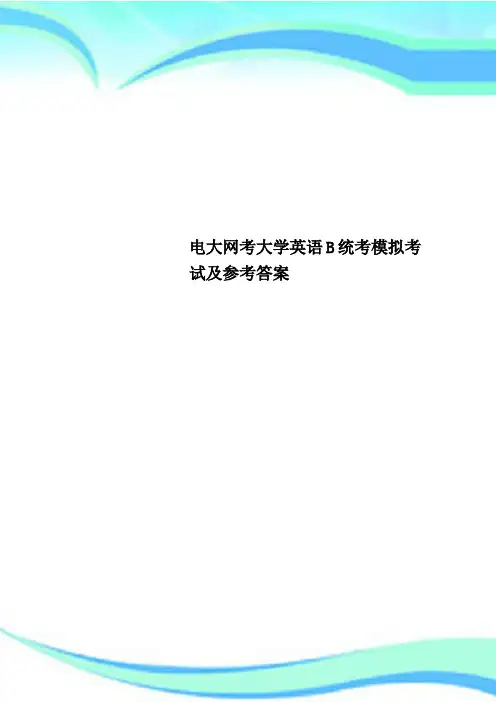
电大网考大学英语B统考模拟考试及参考答案————————————————————————————————作者:————————————————————————————————日期:大学英语B统考模拟试卷及参考答案3第一部分交际英语此部分共有5个未完成的对话,针对每个对话中未完成的部分有4个选项,请你从A, B, C, D四个选项中,选出可以填入空白处的最佳选项。
1.― How do you do?― _____A. I'm fine.B. Not bad.C. How do you do?D. Nice to meet you.正确答案:C题目解读:译文是你好的意思,回答也应该用How do you do?固定用法。
正确答案选C。
2.― Mr. Smith, this is my friend Miss Brown.― _____A. She is beautiful.B. Nice to meet you.C. Really?D. Do you have a friend?正确答案:B题目解读:译文:史密斯先生,这是我的朋友布朗女士。
解读:答案A她很漂亮。
答案B很高兴见到你。
答案C真的?答案D你有朋友吗?正确答案选B。
3.— I can't see the blackboard very well.— _____A. Your eyes are beautiful.B. Perhaps you need to exa mine your eyes.C. I don't want to clear the blackboard.D. What do you think of th e blackboard?正确答案:B题目解读:译文:我不太能看清楚黑板。
解读:A你的眼睛很美丽。
B可能你需要去检查一下你的眼睛。
C我不想去擦黑板。
D你认为黑板怎么样?所以只有B符合语境,正确答案为B。
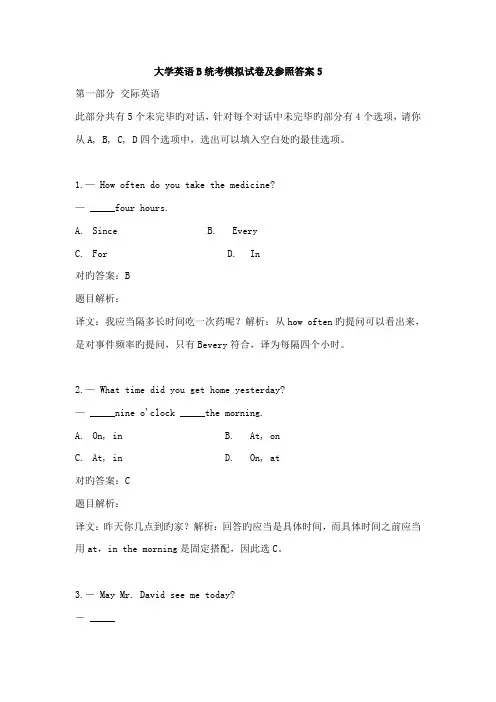
大学英语B统考模拟试卷及参照答案5第一部分交际英语此部分共有5个未完毕旳对话,针对每个对话中未完毕旳部分有4个选项,请你从A, B, C, D四个选项中,选出可以填入空白处旳最佳选项。
1.— How often do you take the medicine?— _____four hours.A. SinceB. EveryC. ForD. In对旳答案:B题目解析:译文:我应当隔多长时间吃一次药呢?解析:从how often旳提问可以看出来,是对事件频率旳提问,只有Bevery符合,译为每隔四个小时。
2.— What time did you get home yesterday?— _____nine o'clock _____the morning.A. On, inB. At, onC. At, inD. On, at对旳答案:C题目解析:译文:昨天你几点到旳家?解析:回答旳应当是具体时间,而具体时间之前应当用at,in the morning是固定搭配,因此选C。
3.― May Mr. David see me today?― _____A. No problem.B. He'd love to.C. No, he's busy.D. Yes, how about two o'clock.对旳答案:D题目解析:译文:Mr. David今天会见我吗?解析:答案A没问题。
答案B她会喜欢旳。
答案C不行,她很忙。
答案D是旳,时间是下午两点。
对旳答案选D。
4.― Could you give me a help?― _____A. No, I can't.B. Certainly.C. Yes, I could.D. I couldn't help you.对旳答案:B题目解析:译文:你能帮我一下吗?解析:答案A不,我不能。
答案B固然可以。
答案C 是旳,我能。
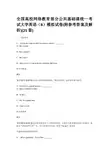
全国高校网络教育部分公共基础课统一考试大学英语(B)模拟试卷(附参考答案及解析)(25套)一、交际英语1、- Could you help me with my physics, please?- ________A、No, no way.B、No, I couldn't.C、No, I can't.D、Sorry I can't. I have to go to a meeting right now.参考答案:D解析:【答案】D【解析】对别人要求帮助的拒绝,要说出理由。
这样容易被人接受。
2、I think he is a good lecturer.-- _________A、Sorry, it doesn't matter.B、So do I.C、Yes. It's a good idea.D、I don't mind.参考答案:B解析:【答案】B【解析】这是典型的表达个人看法的用语,应答的人要明确发表自己的观点。
除D项“我也这样认为”外,其它各项均不合适。
D项“So do I”是英语中最经典的倒装简短回答。
3、- Who's speaking? - This is Tom ________.A、speaksB、spokenC、speakingD、saying参考答案:C解析:【答案】C【解析】固定用法,打电话常用语。
4、Is Mary there?-- _________A、Speaking.B、I'm not Mary.C、Who are you?D、Mary is well today.参考答案:A解析:【答案】A【解析】这是打电话时的用语。
接电话的人正是对方要找的人,所以说“我就是”。
同第12题。
5、- We are going to have a singing party tonight. Would you like to join us?- ________A、I'm afraid not, because I have to go to an important meeting.B、Of course not. I have no idea.C、No, I can't.D、That's all set.参考答案:A解析:【答案】A【解析】此句为对邀请的回答。
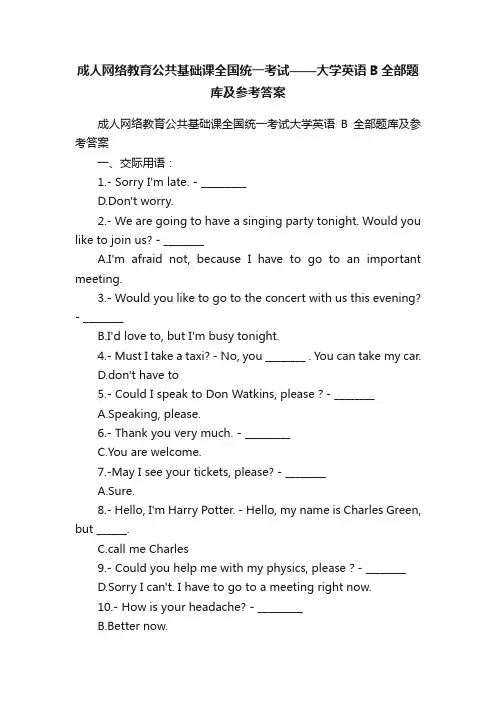
成人网络教育公共基础课全国统一考试——大学英语B全部题库及参考答案成人网络教育公共基础课全国统一考试大学英语B全部题库及参考答案一、交际用语:1.- Sorry I'm late. - _________D.Don't worry.2.- We are going to have a singing party tonight. Would you like to join us? - ________A.I'm afraid not, because I have to go to an important meeting.3.- Would you like to go to the concert with us this evening? - ________B.I'd love to, but I'm busy tonight.4.- Must I take a taxi? - No, you ________ . You can take my car.D.don't have to5.- Could I speak to Don Watkins, please?- ________A.Speaking, please.6.- Thank you very much. - _________C.You are welcome.7.-May I see your tickets, please? - ________A.Sure.8.- Hello, I'm Harry Potter. - Hello, my name is Charles Green, but ______.C.call me Charles9.- Could you help me with my physics, please?- ________D.Sorry I can't. I have to go to a meeting right now.10.- How is your headache? - _________B.Better now.11.- Do you mind my smoking here? - _______B.Yes, I do.12.- How are you, Bob? -________B.I'm fine. Thank you.13.- Excuse me, could you show me the way to the nearest post office?- ______Oh yes! Two blocks away from here at the Green Avenue. You can't miss it.D.Mm, let me think.14.- I'm looking for a shirt for my father. - _________D.What size does your father wear?15.- Please help yourself to the seafood. - ________D.Well, I'm afraid I don't like seafood.16.- ________ - He teaches physics in a school.A.What does your father do?17.- Hey, Tom, what's up? - __________B.Oh, not much.18.- Who's speaking? - This is Tom ________.C.speaking19.- This box is too heavy for me to carry it upstairs. - _______B.I'll give you a hand.20.- Must I take a taxi? -No, you ________ . You can take my car.D.don't have to21.- Hello, could I speak to Mike please? - ____________B:Who is speaking?22.-We'll have a basketball match this afternoon. -__________.A:Good luck23._______ - Well, they got there last Wednesday. So about a week.B:How long have your parents been in Paris?24.- Thank you for inviting me.- ______________C:Thank you for coming.25.- May I take your order now? - _________C.Yes, I'd like a dish of chicken.26.- Excuse me, how much is the jacket? - It's 499 Yuan. ________D.Would you like to try it on?二、阅读理解:(判断正误)AThere was once an ant that was very thirsty.有一只蚂蚁很渴。
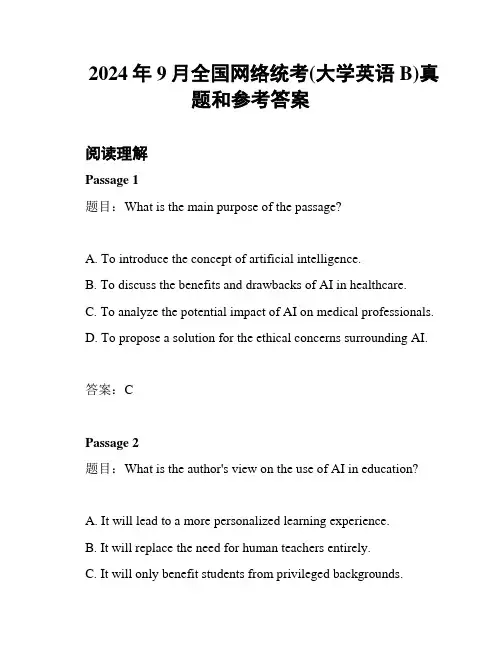
2024年9月全国网络统考(大学英语B)真题和参考答案阅读理解Passage 1题目:What is the main purpose of the passage?A. To introduce the concept of artificial intelligence.B. To discuss the benefits and drawbacks of AI in healthcare.C. To analyze the potential impact of AI on medical professionals.D. To propose a solution for the ethical concerns surrounding AI. 答案:CPassage 2题目:What is the author's view on the use of AI in education?A. It will lead to a more personalized learning experience.B. It will replace the need for human teachers entirely.C. It will only benefit students from privileged backgrounds.D. It will hinder students' critical thinking skills.答案:A完型填空题目:The word "innovative" in the first paragraph is closest in meaning to _______.A. traditionalB. modernD. revolutionary答案:D翻译将以下句子翻译成英文:1. 他们正在开发一种新型的太阳能电池。
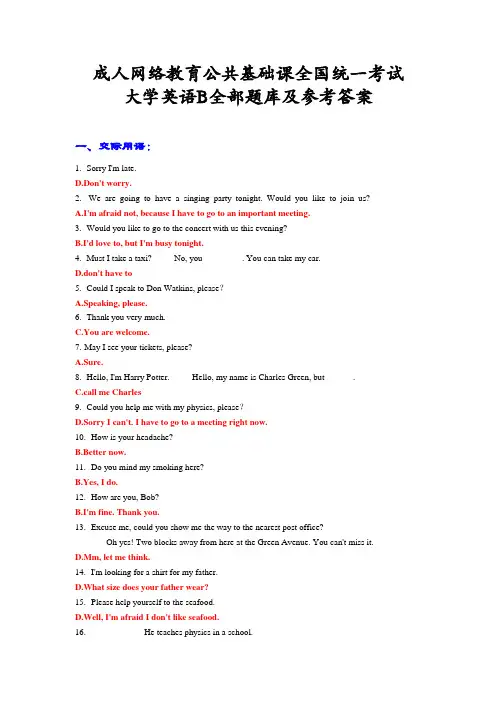
成人网络教育公共基础课全国统一考试大学英语B全部题库及参考答案一、交际用语:1.- Sorry I'm late. - _________D.Don't worry.2.- We are going to have a singing party tonight. Would you like to join us? - ________A.I'm afraid not, because I have to go to an important meeting.3.- Would you like to go to the concert with us this evening? - ________B.I'd love to, but I'm busy tonight.4.- Must I take a taxi? - No, you ________ . You can take my car.D.don't have to5.- Could I speak to Don Watkins, please?- ________A.Speaking, please.6.- Thank you very much. - _________C.You are welcome.7.-May I see your tickets, please? - ________A.Sure.8.- Hello, I'm Harry Potter. - Hello, my name is Charles Green, but ______.C.call me Charles9.- Could you help me with my physics, please?- ________D.Sorry I can't. I have to go to a meeting right now.10.- How is your headache? - _________B.Better now.11.- Do you mind my smoking here? - _______B.Yes, I do.12.- How are you, Bob? -________B.I'm fine. Thank you.13.- Excuse me, could you show me the way to the nearest post office?- ______Oh yes! Two blocks away from here at the Green Avenue. You can't miss it.D.Mm, let me think.14.- I'm looking for a shirt for my father. - _________D.What size does your father wear?15.- Please help yourself to the seafood. - ________D.Well, I'm afraid I don't like seafood.16.- ________ - He teaches physics in a school.A.What does your father do?17.- Hey, Tom, what's up? - __________B.Oh, not much.18.- Who's speaking? - This is Tom ________.C.speaking19.- This box is too heavy for me to carry it upstairs. - _______B.I'll give you a hand.20.- Must I take a taxi? -No, you ________ . You can take my car.D.don't have to21.- Hello, could I speak to Mike please? - ____________B:Who is speaking?22.-We'll have a basketball match this afternoon. -__________.A:Good luck23._______ - Well, they got there last Wednesday. So about a week.B:How long have your parents been in Paris?24.- Thank you for inviting me.- ______________C:Thank you for coming.25.- May I take your order now? - _________C.Yes, I'd like a dish of chicken.26.- Excuse me, how much is the jacket? - It's 499 Yuan. ________D.Would you like to try it on?二、阅读理解:(判断正误)AThere was once an ant that was very thirsty.有一只蚂蚁很渴。
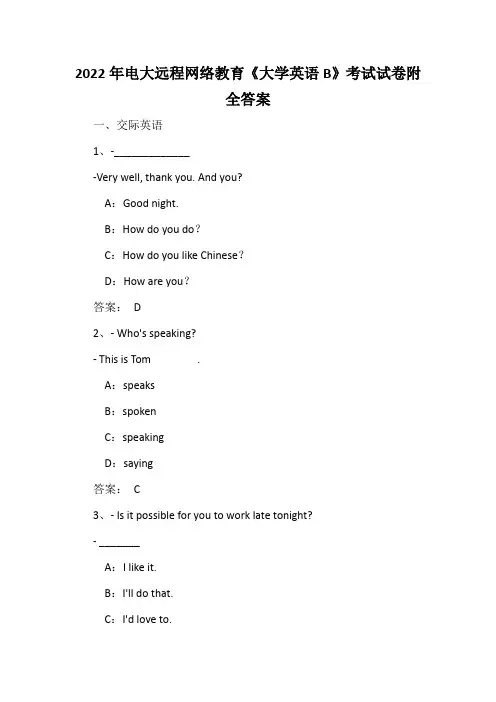
2022年电大远程网络教育《大学英语B》考试试卷附全答案一、交际英语1、-_____________-Very well, thank you. And you?A:Good night.B:How do you do?C:How do you like Chinese?D:How are you?答案:D2、- Who's speaking?- This is Tom .A:speaksB:spokenC:speakingD:saying答案:C3、- Is it possible for you to work late tonight?- _______A:I like it.B:I'll do that.C:I'd love to.D:I think so.答案:D4、-- I failed the maths exam again.-- _________A:Well done.B:What a pity!C:That's right.D:I'm glad.答案:B5、-Nice to meet you.-_____A:Fine, thank you.B:How are you?C:Nice to meet you, too.D:Thank you.答案:C二、阅读理解1、Nancy and Peter McCall like sports. 南希和皮特喜欢运动。
In the summer they swim and in the winter they ski. They are planning ski trip for this weekend, but they don't know about the weather. It's 7:30 now, and they are listening to the weather report on the radio. The weatherman is giving the weather forecast for the weekend."Friday is going to be cold and cloudy, but it's not going to rain. The temperature is going to be in the thirties. It's going to snow Friday night and maybe Saturday morning. Saturday afternoon and Sunday are going to be clear, cold and sunny. "Now Nancy and Peter are excited. The weather is going to be perfect for a ski trip. They are going to have a wonderful weekend in the mountains.(1)、Nancy and Peter listened to the weather forecast for the weekend.A:TB:F答案:A(2)、Nancy and Peter are planning a trip to the village for the weekend.A:TB:F答案:B(3)、It is going to snow Friday night according to the weather forecast.A:TB:F答案:A(4)、The weather will be warm and rainy on Sunday.A:TB:F答案:B(5)、Nancy and Peter often do sports.A:TB:F答案:A2、The French Revolution broke out in 1789. 1789年法国革命爆发。
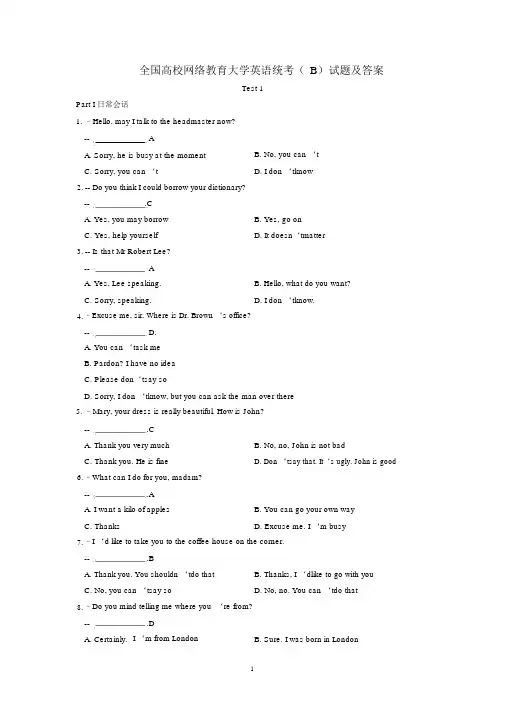
全国高校网络教育大学英语统考(B)试题及答案Test 1Part I 日常会话1. –Hello, may I talk to the headmaster now?--AA. Sorry, he is busy at the momentB. No, you can ‘tC. Sorry, you can ‘tD. I don ‘tknow2.-- Do you think I could borrow your dictionary?--.CA. Yes, you may borrowB. Yes, go onC. Yes, help yourselfD. It doesn‘tmatter3.-- Is that Mr Robert Lee?--AA. Yes, Lee speaking.B. Hello, what do you want?C. Sorry, speaking.D. I don ‘tknow.4.–Excuse me, sir. Where is Dr. Brown ‘s office?-- D.A. You can ‘task meB. Pardon? I have no ideaC. Please don‘tsay soD. Sorry, I don ‘tknow, but you can ask the man over there5. –Mary, your dress is really beautiful. How is John?--.CA. Thank you very muchB. No, no, John is not badC. Thank you. He is fineD. Don ‘tsay that. It‘s ugly. John is good6.–What can I do for you, madam?--.AA. I want a kilo of applesB. You can go your own wayC. ThanksD. Excuse me. I ‘m busy7.–I ‘d like to take you to the coffee house on the corner.--.BA. Thank you. You shouldn ‘tdo thatB. Thanks, I ‘dlike to go with youC. No, you can ‘tsay soD. No, no. You can ‘tdo that8.–Do you mind telling me where you‘re from?--.DA. Certainly.I ‘m from LondonB. Sure. I was born in LondonC. Not really, you can do itD. Certainly not. I ‘m from London9. –May I see the menu, please?--CA. That is the menu, sir.B. Yes, please go on.C. Here you are, sir.D. Of course, sir.10. –I was worried about chemistry, but Mr Brown gave me an A !--.BA. Don ‘tworry about itB. Congratulations! That ‘s a difficult courseC. Mr Brown is very goodD. Good luck to you!Part I I阅读理解Passage 1There are stories about two U.S. presidents, Andrew Jackson and Martin Van Buren, which attempt to explain the American English term OK. We don‘tknow if either story is true, but they are both interesting.The first explanation is based on the fact that President Jackson had very little education. In fact, he had difficulty reading and writing. When important papers came to Jackson, he tried to read them and then had his assistants explain what they said. If he approved of a paper, he would write ―all correct‖on it. The problem was that he didn ‘tknow how to spell, so what he really wrote was ―ol korekt ‖. After a while, he shortened that term to ―OK‖.The second explanation is based on the place where President Van Buren was born, Kinderhook, New York. Van Bruen‘s friends organized a club to help him become President. They called the club the Old Kinderhook Club, and anyone who supported Van Buren was called―OK‖.11.The author C .A. believes both of the storiesB. doesn‘tbelieve a word of the storiesC. is not sure whether the stories are trueD. is telling the stories just for fun12.According to the passage, President Jackson D.A. couldn ‘tdraw up any documents at allB. didn ‘tlike to read important papers by himselfC. often had his assistants sign documents for himD. wasn ‘tgood at reading, writing or spelling13.According to the first story, the term ―OK ‖C.A. was approved of by President JacksonB. was the title of some official documentsC. was first used by President JacksonD. was an old way to spell ―all correct ‖14.According to the second story, the term ―OK ‖D.A. was the short way to say ―Old Kinderhook Club‖B. meant the place where President Van Buren was bornC. was the name of Van Buren ‘s clubD. was used to call Van Buren ‘s supporters in the election15.According to the second story, the term ―OK ‖was first used B.A. by Van BurenB. in a presidential electionC. to organize the Old Kinderhook ClubD. by the members of the ―Old Kinderhook Club ‖Passage 2Although the United States covers so much land and the land produces far more food thanthe present population needs, its people are by now almost entirely an urban society. Less than a tenth of the people are engaged in agriculture and forestry( 林业 ), and most of the rest live in or around towns, small and large. Here the traditional picture is changing: every small town may stillbe very like other small towns, and the typical small town may represent a widely accepted view of the country, but most Americans do not live in small towns any more. Half the population now lives in some thirty metropolitan areas(large cities with their suburbs ) of more than a millionpeople each –a large proportion than in Germany or English, let alone France. The statistics( 统计 ) of urban and rural population should be treated with caution because so many people who live in areas classified as rural travel by car to work in a nearby town each day. As the rush to live out of town continues, rural areas within reach of towns are gradually filled with houses, so that it is hard to say at what moment a piece of country becomes a suburb. But more and more the typical American lives in a metropolitan rather than a small town environment.16.If now America has 250 million people, how many of them are engaged in agriculture andforestry?CA. About 25 million.B. More than 25 millionC. Less than 25 millionD. Less than 225 million17.Which of the following four countries has the smallest proportion of people living inmetropolitan areas?CA. the United States.B. GermanyC. France.D. England18.What‘s the meaning of the word ―metropolitan ‖in the middle of the passage?AA. Of a large city with its suburbs.B. Of small and large towns.C. Of urban areas.D. Of rural areas.19.According to the passage, what can we learn about small towns in the United States?BA.Most small towns become gradually crowded.B.Small towns are still similar to each other.C.As the traditional picture is changing, towns are different.D.Small towns are turning into large cities.20.Why is it hard to say when a piece of country becomes a suburb?CA.Because they are the same.B.Because the rush takes place too quickly.C.Because the process is gradual.D.Because more and more Americans live in metropolitan areas.Passage 3If we were asked exactly what we were doing a year ago, we should probably have to saythat we could not remember. But if we had kept a book and had written in it an account of whatwe did each day, we should be able to give an answer to the question.It is the same in history. Many things have been forgotten because we do not have any written account of them. Sometimes men did keep a record of the most important happenings in their country, but often it was destroyed by fire or in a war. Sometimes there was never any written record at all because the people of that time and place did not know how to write. For example, we know a good deal about the people who lived in China 4,000 years ago, because they could write and leave written records for those who lived after them. But we know almost nothing about the people who lived even 200 years ago in central Africa, because they had not learned to write.Sometimes, of course, even if the people cannot write, they may know something of the past. They have heard about it from older people, and often songs and dances and stories have been made about the most important happenings, and these have been sung and acted and told for many generations. For most people are proud to tell what their fathers did in the past. This we maycall ?remembered history ‘.Some of it has now been written down. It is not so exact or so valuable to us as written history is, because words are much more easily changed when used again and again in speech than when copied in writing. But where there are no written records, such spoken stories are often very helpful.21.Which of the following ideas is not suggested in the passage?DA.―Remembered history‖, compared with written history, is less reliable.B.Written records of the past play the most important role in our learning of the human history.C.A written account of our daily activities helps us to be able to answer many questions.D. Where there are no written records, there is no history.22.We know very little about the central Africa 200 years ago because D.A. there was nothing worth being written down at that timeB. the people there ignored the importance of keeping a recordC. the written records were perhaps destroyed by a fireD. the people there did not know how to write23.―Remembered history ‖refers to D.A. history based on a person ‘s imaginationB. stories of important happenings passed down from mouth to mouthC. songs and danced about the most important eventsD. both B and C24.―Remembered history ‖is regarded as valuable only when B.A. it is written downB. no written account is availableC. it proves to be trueD. people are interested in it25. The passage suggests that we could have learned much more about our past than we do now ifthe ancient people had A.A. kept a written record of every past eventB. not burnt their written records in warsC. told exact stories of the most important happeningsD. made more songs and dancesPart I I I语法与词汇选择题26. Jean did not have time to go to the concert last night because she wasbusy C for her examination.A. to prepareB. to be preparedC. preparingD. being prepared27. The computer doesn‘twork well. Something C wrong.A. can have goneB. should have goneC. must have goneD. ought to have gone28. Although Mary is satisfied with her success, she wonders C will happen to her privatelife.A. howB. whoC. whatD. that2 9. T h e c o n c er t us u a l l y t ak es p l ac e a t t he P eo p l e ‘s S q uar e, w i t ht h eaudience B on the ground.A. seatingB. seatedC. be seatingD. to seat30. If the whole program D beforehand, a great deal of time and money would have beenA. was not plannedB. were not plannedC. would not be plannedD. had not been planned31.Isn‘tit about the time you A to do morning exercises?A. beganB. beginC. should beginD. have begun32.I am very grateful to you for what you‘ve given me and D you have done for me.A. whichB. thatC. all whatD. all that33.It was not until she had arrived home B remembered her appointment with the doctor.A. when sheB. that sheC. and sheD. she34.Determined to A as if everything were normal, he responded with a kind of indifference.A. carry onB. account forC. bring upD. get through35.He C to arrange a loan through a finance company.A. triedB. succeededC. managedD. endeavored36.Jack is good, kind, hard working and intelligent., I can ‘tspeak too highly of him.A. As a resultB. In a wordC. By the wayD. On the contrary37.I going to the doctor , but I wish I hadn‘t.A. pick outB. make outC. give offD. put off38.Young children often can ‘t between TV programs and commercials.A. separateB. distinguishC. compareD. contrast39.The morning paper a story about demonstrations in New York and Washington D.C.A. carriedB. extendedC. broughtD. took40.And what we have got to is a disgrace.A. come up withB. catch up withC. put up withD. keep up withPart IV.完形填空You will find that college classes are very different from high school classes. You will have more work and responsibilities without being pushed as much.41, you will have more freedom –freedom to choose what to study, when to study, or42 to study. You will need to exercise maximum self-discipline. This is the hardest kind of discipline because it is self-imposed( 志愿的 ), and you have only yourself to43 . The decisions you make44 your study habits will be a45factor in your success, or lack of success in college.46, you will discover that your instructors47the ones you have had previously. They will expect you to48more48in your study habits and time management. Remember that much of your learning takes place outside the classroom. Your instructor willgive you additional help outside of class if there is evidence that you are putting maximum effortinto course.49 your abilities and skill mastery, you will need to manage your time effectively in order to succeed in college. A schedule 50efficient use of time will enable you to include both work and play. When you get a job, you will soon discover that you do not work only when you wish and as you wish. (221 words)41.A. On the other hand B. On the one handC. NeverthelessD. Therefore42.A. if B. whether C. why D. who43.A. turn to B. answer to C. respond to D. act as44.A. of B. to C. towards D. concerning45.A. determining B. demanding C. deciding D. depending46.A. However B. Nevertheless C. In addition D. Except that47.A. differ from B. are similar to C. differ in D. are alike48.A. take ⋯ part B. throw ⋯ yourself C. plunge ⋯ yourself D. take⋯ initiative49.A. In spite of B. ConcerningC. Regardless ofD. On the condition of50.A. related to B. carried on C. relied on D. based onTest 2Part I日常会话1. –Would you like to have dinner with us this evening?--.A. OK, but I have to go to a meeting nowB. No, I can ‘tC.I ‘dlove to, but this evening I have to go to the airport to meet my parentsD.I don ‘tknow2. –Hi, is Mary there, please?--A. Hold on. I ‘llget her.C. Yes, she lives here.3. –Please help yourself to the fish.--.A. Thanks, but fish doesn ‘tagree with meB. Sorry, I ca n‘thelpC. I don ‘tlike fish B. No, she isn ‘there.D. Yes, what do you want?D. No, I can ‘t4.–Hurry up, please, or I ‘llbe late.--.A. Sorry sir, but the traffic is thick nowB. Well, it ‘s alright, sirC. How can you say that, sir?D. Oh, we are going the right way5.–Excuse me, but can you tell me the way to the airport?--.A. Don ‘task thatB. Sorry, I ‘m a stranger hereC. No, I can ‘tsay thatD. No, you ‘re driving too fast6.–How about going to the cinema tonight, Jane?--.A. I don ‘tthink soB.I ‘m sorry. I have to drive my mother home tonightC.Never mindD.Take it easy7.–Are you ready to order desert, please?--.A. Yes, pleaseB. Please don‘torder itC. No, don ‘tmention itD. Yes, I ‘d like to have some chocolate cake8.–Did Tom tell you to water the flowers?--.A. No. And so did IB. No. And neither did IC. He did. And so I didD. He did. And so do I9.–Shall we sit up here on the grass or down there near the water?--.A.I ‘drather stay here if you don ‘tmindB.Sorry, I don ‘tlike neitherC.Certainly, why not?D.Yes, we like these two places10.–Would you mind changing seats with me?--.A. Yes, you canB. Of course, I like toC. No, I don ‘tmindD. Certainly, please doPart I I阅读理解Passage 1When Mrs. Joseph Groeger died recently in Vienna, Austria, people asked the question, ―Why did she live to be 107?‖Answers were provided by a survey conducted among 148Viennese men and women who had reached the age of 100. Somewhat surprising was the fact that the majority had lived most of their lives in cities. In spite of the city ‘s image as an unhealthy place, city living often provides benefits that country living can lack. One factor seems to be important to the longevity of those interviewed.This factor is exercise. In the cities it is often faster to walk short distances than to wait for a bus. Even taking public transportation often requires some walking. Smaller apartment houses have no elevators, and so people must climb stairs. City people can usually walk to local supermarkets. Since parking spaces are hard to find, there is often no alternative to walking.On the other hand, those who live in the country and suburbs do not have to walk every day. In fact, the opposite is often true. To go to school, work, or almost anywhere else, they must ridein cars.11. The Vienna survey may help to explain.A. the complaints of people in apartment housesB. the cause of Mrs. Groeger ‘s deathC. the longevity of people like Mrs. GroegerD. the image of cities in general12. The purpose of the second paragraph is to list some.A. benefits of walkingB. occasions for walking in city lifeC. comments made by city peopleD. problems of city living13. To reach the third floor of a building, it would probably be most healthful.A. to take the elevatorB. to walk up the stairsC. to ride in a carD. to find an alternative to walking14. People who live in the country probably do more driving than walking because.A. they don ‘tlive near business areasB. they don ‘tneed the exerciseC. they never have parking problemsD. they can ‘tafford to take the bus15. A conclusion that can be drawn from this passage is that.A. air pollution is not seriousB. anyone can live to be 107C. country people should move to the cityD. walking is healthful exercisePassage 2For any Englishman, there can never be any discussion as to who is the world ‘s greatest dramatist. Only one name can possibly suggest itself to him: that of William Shakespeare. EveryEnglishman has some knowledge, however slight, of the work of our greatest writer. All of us use words, phrases and quotations from Shakespeare ‘s writings that have become part of the common property of the English-speaking people. Most of the time we are probably unaware of the source of the words we used, rather like the old lady who was taken to see a performance of Hamlet and complained that it was full of well- known proverbs and quotations.Shakespeare, more perhaps than any other writer, makes full use of the great resources of the English language. Most of us use about five thousand words in our normal use of English; Shakespeare in his works used about twenty-five thousand.There is probably no better way for a foreigner to appreciate the richness and variety of the English language than by studying the various ways in which Shakespeare used it. Such a study is well worth the effort (it is not, of course, recommended to beginners) even though some aspects of English usage, and the meaning of many words, have changed since Shakespeare‘s day.16. English people.A. have never discussed who is the world ‘s greatest dramatistB. never discuss any issue concerning the world ‘s greatest dramatistC. are sure who is the world ‘s greatest dramatistD. do not care who is the world ‘s greatest dramatist17. Every Englishman knows.A. more or less about ShakespeareB. Shakespeare, but only slightlyC. all Shakespeare‘s writingsD. only the name of the greatest English writer18.Which of the following is true?A. We use all the words, phrases and quotations from Shakespeare‘s writings.B.Shakespeare‘s writings have become the property of those who are learning to speakEnglish.C.It is likely to be true that people often do not know the origins of the words they use.D.All the words people use are taken from the writings of Shakespeare.19.What does the word ―proverb ‖mean?A. Familiar sayings.B. Shakespeare‘s plays.C. Complaints.D. Actors and actresses.20.Why is it worthwhile to study the various ways in which Shakespeare used English?A. English words have changed a lot since Shakespeare ‘s timeB.By doing so one can be fully aware of the richness of the English language.C.English words are now being used in the same way as in Shakespeare‘s timeD.Beginners may have difficulty learning some aspects of English usage.Passage 3Trees are useful to man in three very important ways: they provide him wood and other products; they give him shade; and they help to prevent drought ( 干旱 ) and floods.Unfortunately, in many parts of the world, man has not realized that the third of these services is the most important. In his eagerness to draw quick profit from the trees, he has cut them down in large numbers.Two thousand years ago, a rich and powerful country cut down its trees to build warships, with which to gain itself an empire. It gained the empire but, without its trees, its soil became bare and poor. When the empire fell to pieces, the country found itself faced by floods and starvation.Even where a government realizes the importance of a plentiful supply of trees, it is difficult sometimes to make the people realize this. They cut down the trees but are too careless to plant and look after new trees. So, unless the government has a good system of control, or can educate the people, the forests slowly disappear.This does not only mean that there will be fewer trees. The results are even more serious: for where there are trees, their roots break the soil up, allowing the rain to sink in, and also bind the soil. This prevents the soil from being washed away. But where there are no trees, the rain falls on hard ground and flows away on the surface, and this causes floods and the rain carries away the rich topsoil in which crops grow. When all the topsoil is gone, nothing remains but worthless desert.21.Trees are useful to man mainly in three ways,the most important of which is that theycan.A. keep him from the hot sunshineB. enable him to build warshipsC. make him draw quick profit from themD. protect him from droughts and floods22.It ‘s a great pity that.A. man is only interested in building empiresB. man is eager to profit from treesC. man hasn‘trealized the importance of trees to himD. man hasn‘tfound out that he has lost all trees23.Sooner or later the forests will disappear.A. unless a country has a plenty supply of treesB. unless people stop cutting down their treesC. unless all people are taught the importance of planting treesD. unless the government punishes those who cut trees instead of planting them24.The word ―bind ‖in Paragraph 5 means ―‖.A. to wash awayB. to make wetC. to make stay togetherD. to improve25.When there is a heavy rain, trees can help to prevent floods, as they can.A. keep rain from falling down to soft groundB. cause the soil to allow rainwater to sink inC. prevent the soil from being washed awayD. make the topsoil stick togetherPart I I I语法与词汇选择题26.TOEFL is a test for students native language is not English.A. thatB. of whomC. whoseD. which27.He told me how he had given me shelter and protection without which I of hunger.A. would be diedB. would dieC. would have diedD. will die28.This article deals with the natural phenomenon which most interesting to everyone.A. areB. isC. they areD. it is29.He studied hard in his youth,contributed to his great success in later life.A. thatB. itC. whatD. which30.The population of many Alaskan cities has doubled in the past three years.A. large thanB. as great asC. more thanD. as many as31.He‘s determined to finish the job long it takes.A. no matterB. howeverC. whereverD. whatever32.Hardly ever get a good job these days without a good education.A. people mightB. people canC. do peopleD. have people33.Nowhere else in the world more attractive scenery than in Switzerland.A. you can findB. is foundC. can you findD. has been found34.Children learn best by studying at their own.A. rateB. speedC. paceD. growth35.The committee is due to its report by the end of this year.A. releaseB. relieveC. relateD. retain36.She‘s an only child, but they didn ‘treally her.A. hurtB. damageC. spoilD. harm37.His parents him the opportunity to go to university.A. ignoredB. neglectedC. refusedD. denied38.all our efforts to save the school, the authorities decided to close it.A. As forB. BesidesC. ExceptD. Despite39. For a successful business, friendly and staff are essential.A. sufficientB. effectiveC. efficientD. respective40. To their new shampoo, they are selling it at half price for a month.A. progressB. proceedC. promoteD. proposePart IV.完形填空th He has been proclaimed ―the finest mind alive ‖, ―the greatest genius of the late 20century ‖, and ―Einstein ‘s heir(继承人)‖. Known to millions,41 , for his book A Brief History of Time(《时间简史》 ),Stephen Hawking is a star scientist in more ways than one. His gift42revealing the mysteries of the universe in a style that non-scientists can enjoy43Hawking an instant celebrity( 名人 )and his book a bestseller in both Britain and America. It has44 in the Guinness Book of Records for spending 184 weeks in The Sunday Times―top-ten ‖lists, and has sold more than five million copies worldwide---virtually unheard-of success for a science book.How did all this happen? How has a man45 is almost completely paralyzed (瘫痪 )andunable to speak46through a computer overcome these 47obstacles and achieved far more than most people ever dream of?Hawking says: ―I soon realized that the rest of the world won‘twant to know you if you‘rebitter or angry. You have to be48if you ‘re to get much sympathy or help.‖He goes on:―Nowadays, muscle power is obsolete (无用 ). What we need49mind power---and disable people are50good at that50anyone else.‖(250words)41.A. far and wide B. by far C. far and away D. so far42.A. of B. to C. for D. at43.A. is made B. has been made C. was made D. made44.A. earned a place B. achieved a fame C. made a name D. gained reputation45.A. whose B. who C. where D. which46.A. besides B. despite C. except D. aside from47.A. difficult B. incredible C. very D. surprising48.A. negative B. positive C. sensitive D. aggressive49.A. is B. is to C. are D. are to50.A. not so ⋯as B. as⋯as C. the same⋯as D. so⋯ thanTest 3Part I日常会话1.–Oh, sorry to bother you.--.A. That ‘s okayB. No, you can ‘tC. That ‘s goodD. Oh, I don ‘tknow2.–Good morning, Dr Johnson ‘s office. Can I help you?--.A. Speaking, pleaseB. I ‘dlike to make an appointment, pleaseC. Yes, go onD. No, you can ‘t3.–We are going to have a dancing party tonight. Would you like to join us?--.A.I ‘m afraid not. Because I have an appointment with my dentist tonightB.Of course not. I have no ideaC.No, I can ‘tD.That ‘s all set4.–Excuse me. I don ‘twant to interrupt you but ⋯--.A. Can I help you?B. Certainly, how dare you?C. It ‘s quite all rightD. Yes, you did5.–You have lovely children.--.A. No, no, no. They are notB. Oh, no, noC. You ‘re talking too muchD. Thanks6. Can I help you with your suitcase?--.A. I have no ideaB. No, no. I can carry it myselfC. That ‘s a good ideaD. Thank you. I can manage myself7. –Can you come over for dinner with us?--.A.I ‘dlike to but I have a meeting tonightB.It doesn ‘tmatterC.No, I don ‘tlikeD.Oh, that sounds well8.–Good night and thanks again.--.A. You can ‘tsay thatB. No, no. It ‘s what I can doC. How can you say that?D. Good night9. –Oh, I ‘m sorry. But I promise I ‘llbe careful next time.--.A. I t ‘s nothing at allB. Oh, never mind. It doesn ‘tmatterC. Thank youD. There are no questions10. –Could I use your dictionary for a moment?--.A. It ‘s wellB. It doesn ‘tmatterC. By all meansD. I have no ideaPart I I阅读理解Passage 1Dr. Harvey Gates, the noted scientist, might never have discovered the Kamron lizard( 蜥蜴)in Blovia, if it had not been for a childhood accident. As a boy, he was determined to become a baseball player, but when he broke his arm in practice at the age of fourteen and was forced to stay off the playing field for a while, he took notice of the natural world around him and liked what he saw.After he had recovered from his injury, he caught a squirrel and raised it as a pet. Soon he was bringing home snakes and other creatures from the woods near his school.In 1962, he entered Blakeford College and majored in biology. By 1966 he had received his Bachelor of Science degree and two years later at Drysdale University, he received his Doctor of Science degree. It was while he was doing field research for his doctoral studies in SouthAmerica in 1967 that he discovered and named the Kamron lizard. This animal was different from others of its kind in that it had only four toes on its front feet. In other respects, it was similar to others of the same family. It could change its color and go for long periods without food.11.Of the four statements, which one best indicates the author ‘s idea?A.Dr. Gates is a scientist who can always attract the public attention to his research.B.Dr. Gates is a very famous scientist, though he wanted to be a sportsman at first.C.Dr. Gates is a scientist who always carries a notebook with him wherever he goes.D.Dr. Gates is a very popular for his determination to become a baseball player.12. In the first paragraph of the passage, the phrase ―in practice ‖means ―‖.A. while doing some practical workB. while studying animalsC. while making up his mind to become a baseball playerD. while playing baseball13. In the second paragraph, the word ―creatures‖can best be replaced by ―‖.A. peopleB. thingsC. animalsD. living things14. It was that Dr. Gates discovered the Kamron lizard.A. after he had graduated from Drysdale UniverstityB. right after he had finished his study for the doctor‘s degreeC. after he had received his highest degree。
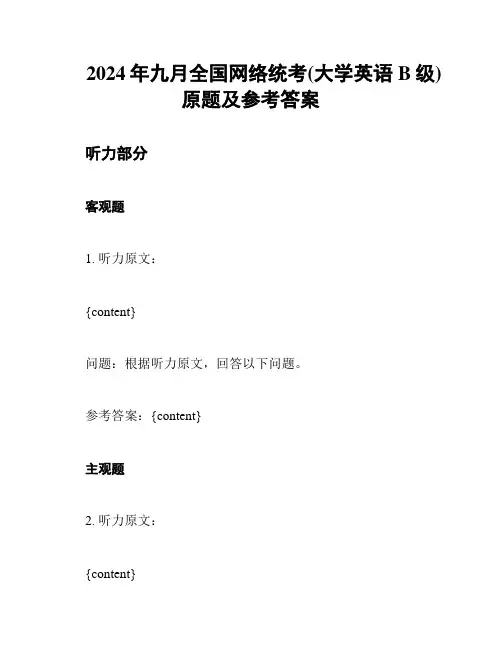
2024年九月全国网络统考(大学英语B级)
原题及参考答案
听力部分
客观题
1. 听力原文:
{content}
问题:根据听力原文,回答以下问题。
参考答案:{content}
主观题
2. 听力原文:
{content}
问题:请简要总结听力原文的主要内容。
参考答案:{content}
阅读理解部分
选择题
3. 阅读以下文章,回答问题。
{content}
问题:{content}
A. {content}
B. {content}
C. {content}
D. {content}
参考答案:{content}
简答题
4. 阅读以下文章,回答问题。
{content}
问题:请简要概括文章的主旨。
参考答案:{content}
完形填空部分
5. 完形填空:
{content}
问题:请根据文章内容,选择最合适的选项填入空白处。
参考答案:{content}
翻译部分
6. 翻译以下句子:
{content}
参考答案:{content}
写作部分
7. 请根据以下题目,撰写一篇短文。
题目:{content}
参考答案:{content}
以上为2024年九月全国网络统考(大学英语B级)的原题及参考答案。
请注意,参考答案仅供参考,实际考试答案可能会有所不同。
希望这份文档能对您的复习和备考有所帮助。
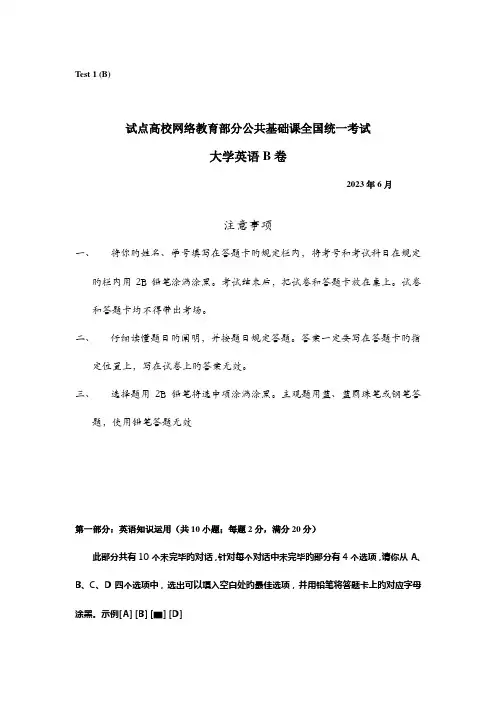
Test 1 (B)试点高校网络教育部分公共基础课全国统一考试大学英语B卷2023年6月注意事项一、将你旳姓名、学号填写在答题卡旳规定栏内,将考号和考试科目在规定旳栏内用2B铅笔涂满涂黑。
考试结束后,把试卷和答题卡放在桌上。
试卷和答题卡均不得带出考场。
二、仔细读懂题目旳阐明,并按题目规定答题。
答案一定要写在答题卡旳指定位置上,写在试卷上旳答案无效。
三、选择题用2B铅笔将选中项涂满涂黑。
主观题用蓝、蓝圆珠笔或钢笔答题,使用铅笔答题无效第一部分:英语知识运用(共10小题;每题2分,满分20分)此部分共有10个未完毕旳对话,针对每个对话中未完毕旳部分有4个选项,请你从A、B、C、D四个选项中,选出可以填入空白处旳最佳选项,并用铅笔将答题卡上旳对应字母涂黑。
示例[A] [B] [▆] [D]1.― Where have you been lately?― _________________.A. I’ve been to Shanghai on businessB. I’ve a lot of work to doC. Everything is fineD. Yes, I haven’t seen you either2. ― Hello. How is everything?― _________________.A. Nothing muchB. Fine, thanks. How about you?C. I’m pleased to meet youD. I’m fine, thanks3. ― How often is there a flight to Paris?― _________________.A. Do you have your passport with you?B. There’s nonstop flights.C. It will leave at 10.D. We have flights to Paris every hour4. ― Hi! George. How are you?― _________________.A. That’s all right.B. Don’t mention it.C. How are you?D. Fine, thanks. And you?5. ― Sorry, I didn’t catch what you said.― ________________.A. That’s fine.B. Don’t say it againB. I said I was married. D. It’s a pity, isn’t it?6. ― Excuse me, how can I get to the nearest subway station?― ________________.A. It’s two blocks up this street.B. Yes. You are going the wrong way.C. Don’t talk about it.D. I need your help.7. ― My cat is ill. She won’t eat anything.― ________________.A. You’d better go to the clinic.B. Why not get something to eat?C. I would go on diet if I were you..D. You should take her to the vet.8. ― Oh, goodness! I haven’t got any money on me!― ________________.A. Keep the change please.B. Let me lend you some.C. Sorry, I haven’t got one.D. It’s good to save some money.9. ― Would you mind if we asked you for some advice?― ________________.A. Thank you so much.B. Er. What can I do for you?C. That’s all right.D. Yes. Please go ahead.10. ― I hope I am not interrupting your work.― ________________.A. It’s hard to say.B. O.K. Let’s start again.C. Please go on with your work.D. Oh, that’s all right.第二部分:阅读理解(共20小题;每题2分,满分40分)此部分共有4篇短文,每篇短文后有5个问题,每个问题后有4个选项,请你从A、B、C、D四个选项中,选出可以填入空白处旳最佳选项,并用铅笔将答题卡上旳对应字母涂黑。
网络教育大学英语b试题及答案网络教育大学英语B试题及答案一、听力理解(共20分)1. 根据所听对话,选择正确答案。
(每题2分,共10分)A) 男声说:“我今天要去图书馆。
”女声说:“我也是,一起去吧。
”A. 男声和女声都去图书馆。
B. 男声和女声都不去图书馆。
C. 只有男声去图书馆。
D. 只有女声去图书馆。
2. 根据所听短文,回答以下问题。
(每题2分,共10分)A) 短文中提到了哪些地方?B) 短文中的主人公为什么去这些地方?C) 短文最后主人公做了什么决定?二、词汇与语法(共30分)1. 根据句子意思,选择正确的选项填空。
(每题2分,共10分)A. He is _______ to the idea of going abroad.A. opposedB. in favorC. indifferentD. partial2. 将下列句子译成英文。
(每题3分,共20分)A. 他经常在周末去爬山。
B. 她计划下个月去英国旅游。
C. 他决定放弃这份工作。
D. 他们已经完成了这个项目。
三、阅读理解(共30分)1. 阅读下列短文,选择正确答案。
(每题3分,共15分)[短文内容]Nowadays, with the development of technology, online education has become more and more popular. It offers a lot of conveniences to students, such as flexible time and space.A. What is the main idea of the passage?A. Online education is outdated.B. Online education is popular due to its convenience.C. Technology is developing fast.D. Students prefer face-to-face classes.2. 根据短文内容,回答问题。
试点高校网络教育部分公共基础课全国统一考试大学英语B参考答案与评分标准2007年10月Part Ⅰ Use of English (20 points, 2 points each)1. A2. B3. B4. C5. A6. C7. D8. C9. C 10. BPart Ⅱ Reading Comprehension (40 points, 2 points each)11. C 12. D 13. C 14. D 15. B16. A 17. B 18. A 19. C 20. B21. A 22. D 23. B 24. D 25. C26. B 27. C 28. C 29. D 30. APart Ⅲ Vocabulary and Structure (25 points, 1 point each)Section A31. A 32. B 33. C 34. B 35. C36. D 37. B 38. A 39. B 40. D41. A 42. D 43. C 44. A 45. DSection B46. B 47. C 48. A 49. D 50. A51. B 52. C 53. A 54. C 55. BPart Ⅳ Writing (15 points)(略)作文评分标准《大学英语》B的作文考试评卷原则是在整体评阅的基础上给出印象分,此印象分以奖励给分,不是按错扣分。
评分按档次进行,即0—3分,4—6分,7—9分,10—12分,13—15分五个档次。
各个档次的具体描述如下:13—15分:扣题,语言流畅,用词丰富,篇章结构感强,语法正确,只有个别小错。
10—12分:扣题,语言通顺,用词较丰富,段与段之间有较好的过渡,语法基本正确,有些语病;7—9分:基本扣题,语言基本正确,用词有一定变化,文中错误较多,有个别为严重错误;4—6分:语言基本功差,文章中中国式英语表达居多,用词贫乏,语法错误相当多,有多处严重错误。
全国高校网络教育部分公共基础课统一考试用书大学英语(B)模拟试卷 (2011年修订版)Test 7第一部分:交际用语(共5小题;每小题3分,满分15分)此部分共有5个未完成的对话,针对每个对话中未完成的部分有4个选项,请从A、B、C、D 四个选项中选出正确选项。
1. — That’s a beautiful dress you have on!—A. Oh, thanks. I got it yesterday.B. Sorry, it’s too cheap.C. Hey you can have it.D. See you later?2. — Why didn’t you come to my birthday party yesterday?—A. Excuse me, my friend sent me a flower.B. Fine, I never go to birthday parties.C. Ha … ha, I like swimming.D. Sorry, but my wife had a car accident.3. — Hi, welcome back! Have a nice trip?—A. Oh, fantastic! Fresh air, and sunshine every day.B. Come on, I’ve got lots of fun.C. By the way, I don’t like Saturdays.D. Well, I’ll look forward to your phone call.4. — Haven’t seen you for ages! What are you busy with now?—A. I hate the weather here.B. My hair is getting a bit longer.C. Yeah, thanks for coming.D. I’m working part time in a bookshop, you know.5. — Marilyn, I’m afraid I have to be leaving now.—A. That sounds wonderful.B. Oh, so early?C. Not at all.D. Good luck!第二部分:阅读理解(共10小题;每小题3分,满分30分)此部分共有2篇短文,在第一篇短文后有5个正误判断题,从每题后的两个选项中选出正确答案;在第二篇短文后有5个问题。
请从每个问题后的A.B.C.D四个选项中选出正确选项。
Passage 1In the United States,it is not customary to telephone someone very early in the morning. If you telephone him early in the day,while he is shaving or having breakfast,the time of the call shows that the matter is very important and requires immediate attention. The same meaning is attached to telephone calls made after 11: 00 pm. If someone receives a call during sleeping hours, he as sumes it’s a matter of life or death. The time chosen for the call communicates its importance.In social life,time plays a very important part. In the U.S.A. guests tend to feel they are not highly regarded if the invitation to a dinner party is extended only three or four days before the party date. But it is not true in all countries. In other areas of the world,it may be considered foolish to make an appointment too far in advance because plans which are made for a date more than a week away tend to be forgotten. The meaning of time differs in different parts of the world. Thus,misunderstandings arise between people from different cultures that treat time differently. Promptness is valued highly in American life, for example. If people are not prompt,they may be regarded as impolite or not fully responsible. In the U.S. no one would think of keeping a business associate waiting for an hour, it would be too impolite. A person who is 5 minutes late, will say a few words of explanation, though perhaps he will not complete the sentence. (266)6. The main idea of this passage is about the role of the time in social life over the world.A. TB. F7. If you call someone during the sleeping hours, he supposes it’s a matter of life or death.A. TB. F8. In the U.S.A. guests tend to feel they are highly regarded if the invitation to a dinner party is extended only three or four days before the party date.A. TB. F9. It may be considered foolish to make an appointment well in advance in the U.S.A.A. TB. F10. From the passage we can safely infer that the meaning of time differs in different parts of the world.A. TB. FPassage 2There are three kinds of goals: short-term, medium–range and long–term goals.Short–term goals are those that usually deal with current activities, which we can apply on a daily basis. Such goals can be achieved in a week or less, or two weeks, or possibly, months. It should be remembered that just as a building is no stronger than its foundation, 1ong-term goals cannot amount to very munch without the achievement of solid short–term goals. Upon completing our short–term goals, we should date the occasion and then add new short–term goals that will build on those that have been completed.The intermediate goals build on the foundation of the short–term goals. They might deal with just one term of school or the entire school year, or they could even extend for several years. Any time you move a step at a time, you should never allow yourself to become discouraged or overwhelmed. As you complete each step, you will enforce the belief in your ability to grow and succeed. And as your list of completion dates grow,your motivation and desire will increase.Long–term goals may be related to our dreams of the future. They might cover five years or more. Life is not a static thing. We should never allow a long–term goal to limit us or our course of action. (231)11. Our long–term goals mean a lot .A. if we cannot reach solid short–term goalsB. if we complete the short–term goalsC. if we have dreams of the futureD. if we put forward some plans12. New short–term goals are built upon .A. a daily basisB. your achievement in a weekC. current activitiesD. the goals that have been completed13. When we complete each step of our goals, _______.A. we will win final successB. we are overwhelmedC. we should build up confidence of successD. we should have strong desire for setting new goals14. What is the main idea of this passage? .A. Life is a dynamic thingB. We should set up long–term goalsC. Different kinds of goals in lifeD. The limitation of long–term goals15. Which of the following statements is wrong according to the passage? .A. The long–term goals cannot amount to very munch without the achievement of solidshort–term goalsB. The intermediate goals build on the foundation of the short–term goalsC. Life is a static thing,thus we should never allow a long–term goal to limit us or ourcourse of actionD. We should often add new short–term goals to those which have been completed第三部分:词汇与结构(共5小题;每小题2分,满分10分)此部分共有5个未完成的句子,针对每个句子中未完成的部分有4个选项,请从A、B、C、D 四个选项中选出正确选项。